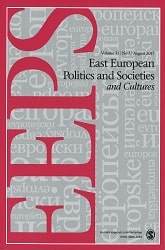Weak States and Pluralism: The Case of Moldova
Weak States and Pluralism: The Case of Moldova
Author(s): Lucan A. WaySubject(s): Civil Society, Political history, Government/Political systems, Transformation Period (1990 - 2010), Post-Communist Transformation, Sociology of Politics
Published by: SAGE Publications Ltd
Keywords: democratization; Moldova; weak states; post-Soviet politics; elite networks;
Summary/Abstract: This article argues that Moldova’s weak state, tenuous elite networks, and polarized politics have provided key sources of democracy in the post-Soviet period. In the face of a weak civil society, severe economic decline, civil war, low income per capita, and an absence of a democratic history, Moldovan democracy in the 1990s was stronger than in any other non-Baltic, post-Soviet republic. The country is best understood not as a struggling or unconsolidated democracy but instead as a case of failed authoritarianism or “pluralism by default.” In cases of pluralism by default, democratic political competition endures not because civil society is strong or leaders democratic but because politicians are too polarized and the state too feeble to enforce authoritarian rule in a liberal international context. In such cases, the same factors that promote pluralism may also undermine governance and state viability.
Journal: East European Politics and Societies
- Issue Year: 17/2003
- Issue No: 03
- Page Range: 454-482
- Page Count: 29
- Language: English
- Content File-PDF

